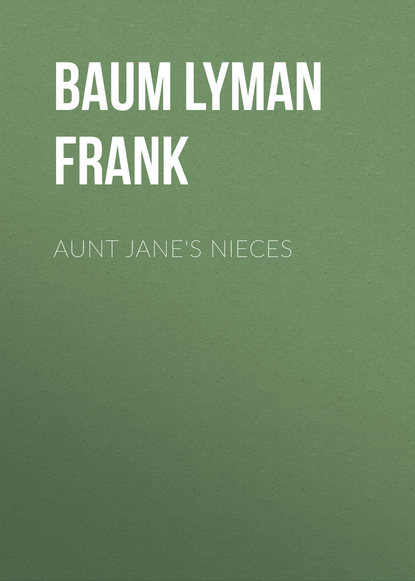По всем вопросам обращайтесь на: info@litportal.ru
(©) 2003-2024.
✖
Aunt Jane's Nieces
Настройки чтения
Размер шрифта
Высота строк
Поля
The woman frowned. It was not difficult for her to read the character of the child before her, and she knew intuitively that Beth was strongly prejudiced against her, but was honestly trying not to allow that prejudice to influence her. She decided to postpone further interrogations until another time.
"Your journey has tired you," she said abruptly. "I'll have Misery show you to your room."
She touched a bell beside her.
"I'm not tired, but I'll go to my room, if you please," answered Beth, who realized that she had in some way failed to make as favorable an impression as she had hoped. "When may I see you again?"
"When I send for you," snapped Aunt Jane, as the housekeeper entered.
"I suppose you know I am a paralytic, and liable to die at any time?"
"I am very sorry," said Beth, hesitatingly. "You do not seem very ill."
"I'm on my last legs. I may not live an hour. But that's none of your business, I suppose. By the way, I expect your cousin on the afternoon train."
Beth gave a start of surprise.
"My cousin?" she asked.
"Yes, Louise Merrick."
"Oh!" said Beth, and stopped short.
"What do you mean by that?" enquired Aunt Jane, with a smile that was rather malicious.
"I did not know I had a cousin," said the girl. "That is," correcting herself, "I did not know whether Louise Merrick was alive or not. Mother has mentioned her name once or twice in my presence; but not lately."
"Well, she's alive. Very much alive, I believe. And she's coming to visit me, while you are here. I expect you to be friends."
"To be sure," said Beth, nevertheless discomfited at the news.
"We dine at seven," said Aunt Jane. "I always lunch in my own room, and you may do the same," and with a wave of her thin hand she dismissed the girl, who thoughtfully followed the old housekeeper through the halls.
It was not going to be an easy task to win this old woman's affection. Already she rebelled at the necessity of undertaking so distasteful a venture and wondered if she had not made a mistake in trying to curb her natural frankness, and to conciliate a creature whose very nature seemed antagonistic to her own. And this new cousin, Louise Merrick, why was she coming to Elmhurst? To compete for the prize Beth had already determined to win? In that case she must consider carefully her line of action, that no rival might deprive her of this great estate. Beth felt that she could fight savagely for an object she so much desired. Her very muscles hardened and grew tense at the thought of conflict as she walked down the corridor in the wake of old Misery the housekeeper. She had always resented the sordid life at Cloverton. She had been discontented with her lot since her earliest girlhood, and longed to escape the constant bickerings of her parents and their vain struggles to obtain enough money to "keep up appearances" and drive the wolf from the door. And here was an opportunity to win a fortune and a home beautiful enough for a royal princess. All that was necessary was to gain the esteem of a crabbed, garrulous old woman, who had doubtless but a few more weeks to live. It must be done, in one way or another; but how? How could she out-wit this unknown cousin, and inspire the love of Aunt Jane?
"If there's any stuff of the right sort in my nature," decided the girl, as she entered her pretty bedchamber and threw herself into a chair, "I'll find a way to win out. One thing is certain – I'll never again have another chance at so fine a fortune, and if I fail to get it I shall deserve to live in poverty forever afterward."
Suddenly she noticed the old housekeeper standing before her and regarding her with a kindly interest. In an instant she sprang up, threw her arms around Misery and kissed her furrowed cheek.
"Thank you for being so kind," said she. "I've never been away from home before and you must be a mother to me while I'm at Elmhurst."
Old Misery smiled and stroked the girl's glossy head.
"Bless the child!" she said, delightedly; "of course I'll be a mother to you. You'll need a bit of comforting now and then, my dear, if you're going to live with Jane Merrick."
"Is she cross?" asked Beth, softly.
"At times she's a fiend," confided the old housekeeper, in almost a whisper. "But don't you mind her tantrums, or lay 'em to heart, and you'll get along with her all right."
"Thank you," said the girl. "I'll try not to mind."
"Do you need anything else, deary?" asked Misery, with a glance around the room.
"Nothing at all, thank you."
The housekeeper nodded and softly withdrew.
"That was one brilliant move, at any rate," said Beth to herself, as she laid aside her hat and prepared to unstrap her small trunk. "I've made a friend at Elmhurst who will be of use to me; and I shall make more before long. Come as soon as you like, Cousin Louise! You'll have to be more clever than I am, if you hope to win Elmhurst."
CHAPTER VIII.
THE DIPLOMAT
Aunt Jane was in her garden, enjoying the flowers. This was her especial garden, surrounded by a high-box hedge, and quite distinct from the vast expanse of shrubbery and flower-beds which lent so much to the beauty of the grounds at Elmhurst. Aunt Jane knew and loved every inch of her property. She had watched the shrubs personally for many years, and planned all the alterations and the construction of the flower-beds which James had so successfully attended to. Each morning, when her health permitted, she had inspected the greenhouses and issued her brief orders – brief because her slightest word to the old gardener incurred the fulfillment of her wishes. But this bit of garden adjoining her own rooms was her especial pride, and contained the choicest plants she had been able to secure. So, since she had been confined to her chair, the place had almost attained to the dignity of a private drawing-room, and on bright days she spent many hours here, delighting to feast her eyes with the rich coloring of the flowers and to inhale their fragrance. For however gruff Jane Merrick might be to the people with whom she came in contact, she was always tender to her beloved flowers, and her nature invariably softened when in their presence.
By and by Oscar, the groom, stepped through an opening in the hedge and touched his hat.
"Has my niece arrived?" asked his mistress, sharply.
"She's on the way, mum," the man answered, grinning. "She stopped outside the grounds to pick wild flowers, an' said I was to tell you she'd walk the rest o' the way."
"To pick wild flowers?"
"That's what she said, mum. She's that fond of 'em she couldn't resist it. I was to come an' tell you this, mum; an' she'll follow me directly."
Aunt Jane stared at the man sternly, and he turned toward her an unmoved countenance. Oscar had been sent to the station to meet Louise Merrick, and drive her to Elmhurst; but this strange freak on the part of her guest set the old woman thinking what her object could be. Wild flowers were well enough in their way; but those adjoining the grounds of Elmhurst were very ordinary and unattractive, and Miss Merrick's aunt was expecting her. Perhaps —
A sudden light illumined the mystery.
"See here, Oscar; has this girl been questioning you?"
"She asked a few questions, mum."
"About me?"
"Some of 'em, if I remember right, mum, was about you."
"And you told her I was fond of flowers?"
"I may have just mentioned that you liked 'em, mum."
Aunt Jane gave a scornful snort, and the man responded in a curious way. He winked slowly and laboriously, still retaining the solemn expression on his face.
"You may go, Oscar. Have the girl's luggage placed in her room."
"Yes, mum."
He touched his hat and then withdrew, leaving Jane Merrick with a frown upon her brow that was not caused by his seeming impertinence.
"Your journey has tired you," she said abruptly. "I'll have Misery show you to your room."
She touched a bell beside her.
"I'm not tired, but I'll go to my room, if you please," answered Beth, who realized that she had in some way failed to make as favorable an impression as she had hoped. "When may I see you again?"
"When I send for you," snapped Aunt Jane, as the housekeeper entered.
"I suppose you know I am a paralytic, and liable to die at any time?"
"I am very sorry," said Beth, hesitatingly. "You do not seem very ill."
"I'm on my last legs. I may not live an hour. But that's none of your business, I suppose. By the way, I expect your cousin on the afternoon train."
Beth gave a start of surprise.
"My cousin?" she asked.
"Yes, Louise Merrick."
"Oh!" said Beth, and stopped short.
"What do you mean by that?" enquired Aunt Jane, with a smile that was rather malicious.
"I did not know I had a cousin," said the girl. "That is," correcting herself, "I did not know whether Louise Merrick was alive or not. Mother has mentioned her name once or twice in my presence; but not lately."
"Well, she's alive. Very much alive, I believe. And she's coming to visit me, while you are here. I expect you to be friends."
"To be sure," said Beth, nevertheless discomfited at the news.
"We dine at seven," said Aunt Jane. "I always lunch in my own room, and you may do the same," and with a wave of her thin hand she dismissed the girl, who thoughtfully followed the old housekeeper through the halls.
It was not going to be an easy task to win this old woman's affection. Already she rebelled at the necessity of undertaking so distasteful a venture and wondered if she had not made a mistake in trying to curb her natural frankness, and to conciliate a creature whose very nature seemed antagonistic to her own. And this new cousin, Louise Merrick, why was she coming to Elmhurst? To compete for the prize Beth had already determined to win? In that case she must consider carefully her line of action, that no rival might deprive her of this great estate. Beth felt that she could fight savagely for an object she so much desired. Her very muscles hardened and grew tense at the thought of conflict as she walked down the corridor in the wake of old Misery the housekeeper. She had always resented the sordid life at Cloverton. She had been discontented with her lot since her earliest girlhood, and longed to escape the constant bickerings of her parents and their vain struggles to obtain enough money to "keep up appearances" and drive the wolf from the door. And here was an opportunity to win a fortune and a home beautiful enough for a royal princess. All that was necessary was to gain the esteem of a crabbed, garrulous old woman, who had doubtless but a few more weeks to live. It must be done, in one way or another; but how? How could she out-wit this unknown cousin, and inspire the love of Aunt Jane?
"If there's any stuff of the right sort in my nature," decided the girl, as she entered her pretty bedchamber and threw herself into a chair, "I'll find a way to win out. One thing is certain – I'll never again have another chance at so fine a fortune, and if I fail to get it I shall deserve to live in poverty forever afterward."
Suddenly she noticed the old housekeeper standing before her and regarding her with a kindly interest. In an instant she sprang up, threw her arms around Misery and kissed her furrowed cheek.
"Thank you for being so kind," said she. "I've never been away from home before and you must be a mother to me while I'm at Elmhurst."
Old Misery smiled and stroked the girl's glossy head.
"Bless the child!" she said, delightedly; "of course I'll be a mother to you. You'll need a bit of comforting now and then, my dear, if you're going to live with Jane Merrick."
"Is she cross?" asked Beth, softly.
"At times she's a fiend," confided the old housekeeper, in almost a whisper. "But don't you mind her tantrums, or lay 'em to heart, and you'll get along with her all right."
"Thank you," said the girl. "I'll try not to mind."
"Do you need anything else, deary?" asked Misery, with a glance around the room.
"Nothing at all, thank you."
The housekeeper nodded and softly withdrew.
"That was one brilliant move, at any rate," said Beth to herself, as she laid aside her hat and prepared to unstrap her small trunk. "I've made a friend at Elmhurst who will be of use to me; and I shall make more before long. Come as soon as you like, Cousin Louise! You'll have to be more clever than I am, if you hope to win Elmhurst."
CHAPTER VIII.
THE DIPLOMAT
Aunt Jane was in her garden, enjoying the flowers. This was her especial garden, surrounded by a high-box hedge, and quite distinct from the vast expanse of shrubbery and flower-beds which lent so much to the beauty of the grounds at Elmhurst. Aunt Jane knew and loved every inch of her property. She had watched the shrubs personally for many years, and planned all the alterations and the construction of the flower-beds which James had so successfully attended to. Each morning, when her health permitted, she had inspected the greenhouses and issued her brief orders – brief because her slightest word to the old gardener incurred the fulfillment of her wishes. But this bit of garden adjoining her own rooms was her especial pride, and contained the choicest plants she had been able to secure. So, since she had been confined to her chair, the place had almost attained to the dignity of a private drawing-room, and on bright days she spent many hours here, delighting to feast her eyes with the rich coloring of the flowers and to inhale their fragrance. For however gruff Jane Merrick might be to the people with whom she came in contact, she was always tender to her beloved flowers, and her nature invariably softened when in their presence.
By and by Oscar, the groom, stepped through an opening in the hedge and touched his hat.
"Has my niece arrived?" asked his mistress, sharply.
"She's on the way, mum," the man answered, grinning. "She stopped outside the grounds to pick wild flowers, an' said I was to tell you she'd walk the rest o' the way."
"To pick wild flowers?"
"That's what she said, mum. She's that fond of 'em she couldn't resist it. I was to come an' tell you this, mum; an' she'll follow me directly."
Aunt Jane stared at the man sternly, and he turned toward her an unmoved countenance. Oscar had been sent to the station to meet Louise Merrick, and drive her to Elmhurst; but this strange freak on the part of her guest set the old woman thinking what her object could be. Wild flowers were well enough in their way; but those adjoining the grounds of Elmhurst were very ordinary and unattractive, and Miss Merrick's aunt was expecting her. Perhaps —
A sudden light illumined the mystery.
"See here, Oscar; has this girl been questioning you?"
"She asked a few questions, mum."
"About me?"
"Some of 'em, if I remember right, mum, was about you."
"And you told her I was fond of flowers?"
"I may have just mentioned that you liked 'em, mum."
Aunt Jane gave a scornful snort, and the man responded in a curious way. He winked slowly and laboriously, still retaining the solemn expression on his face.
"You may go, Oscar. Have the girl's luggage placed in her room."
"Yes, mum."
He touched his hat and then withdrew, leaving Jane Merrick with a frown upon her brow that was not caused by his seeming impertinence.

















